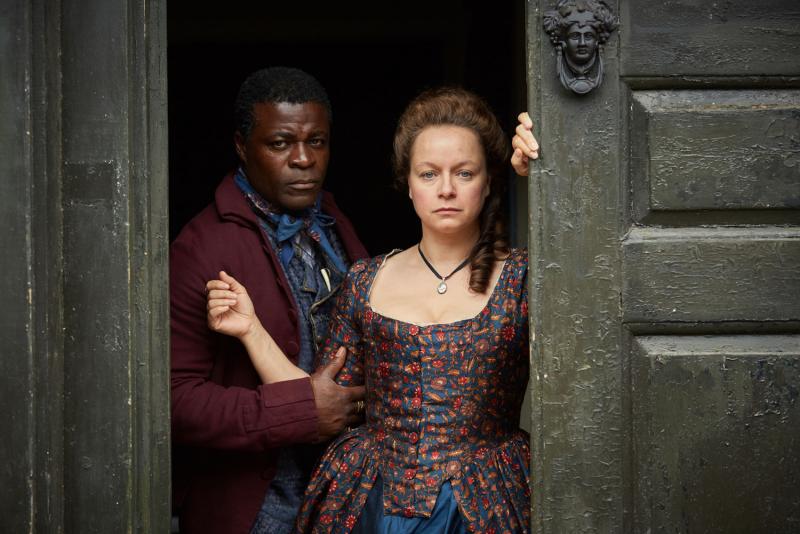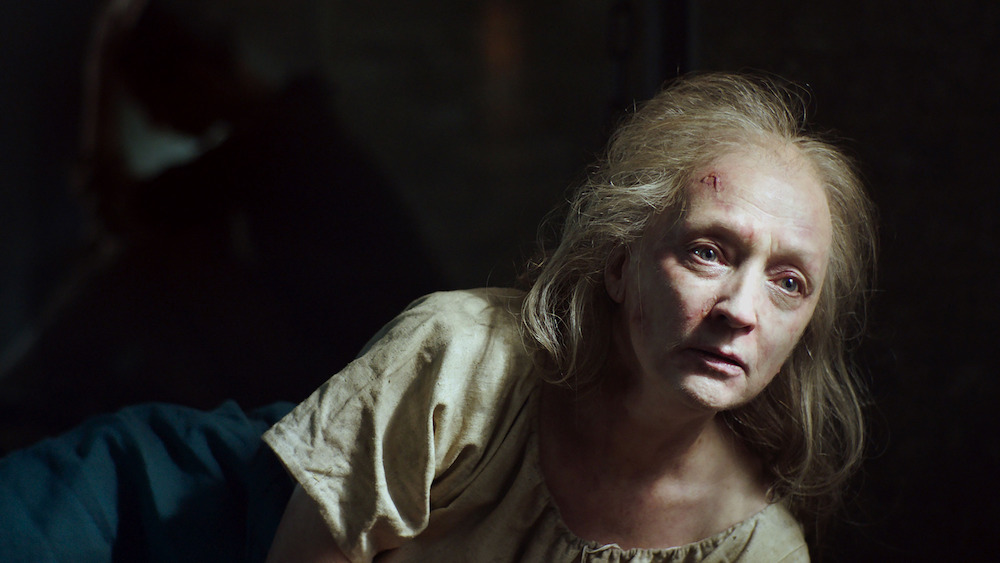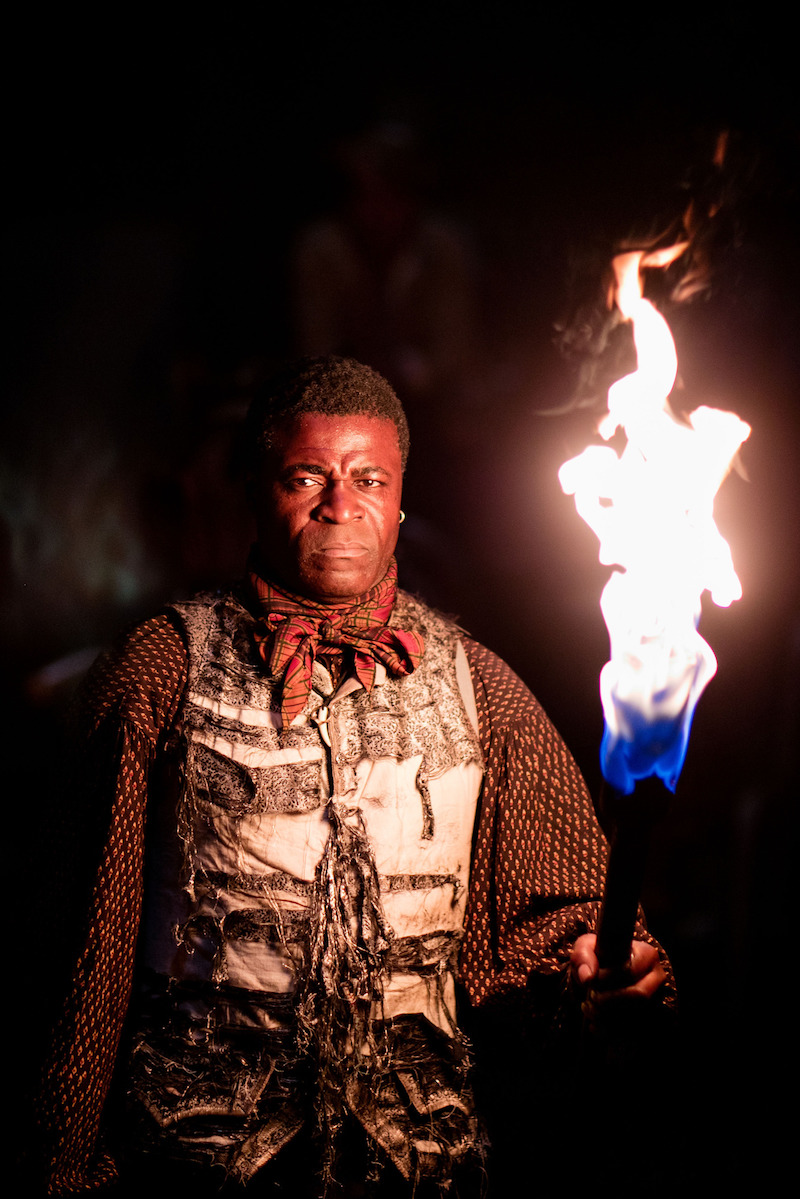Harlots, BBC Two review – sublime, ridiculous, and always entertaining | reviews, news & interviews
Harlots, BBC Two review – sublime, ridiculous, and always entertaining
Harlots, BBC Two review – sublime, ridiculous, and always entertaining
Samantha Morton and Danny Sapani ground third series of madcap brothel drama

Back to Georgian brothels, now – at least, for those of us who don’t have a Hulu subscription. The BBC’s airing of the second series of Harlots over the summer felt strangely timely. Barely an episode in and an angry crowd was hammering at the local judge’s door, demanding justice after the needless death of one of the city’s poorest residents.
Harlots, created by Moira Buffini and Alison Newman, is billed as a bodice-ripping yarn about the rivalry between arch-bawds Margaret Wells (Samantha Morton) and Lydia Quigley (Lesley Manville, pictured below), and it certainly lives up to the label: nary a bodice survives intact. The rate of heaving bosoms per episode is almost as high as the breeches, but the first series made it clear it wasn’t going to waste time on the well-trodden period path of the many-varied sufferings of rich white men. Instead, this is a nuanced portrayal of life in Georgian London for those who don’t fit in, whether by dint of skin colour, gender, or financial situation. It doesn’t so much pass the Bechdel test as crash out of the reverse Bechdel test spectacularly. Whole scenes go by without a peep from a male character. Coincidentally, all the episodes are directed by women.
 Margaret is our tragic hero, her fatal flaw her obsession with Mrs Quigley. You can’t really blame her: Quigley bought a ten-year-old Margaret from her mother for a pair of shoes, as Margaret constantly reminds her two daughters, Charlotte (Jessica Brown Findlay, giving her best cockney accent) and Lucy (Eloise Smyth). Margaret and her partner Will (Danny Sapani, consistently excellent) are the proprietors of a brothel in Greek Street, and Margaret’s feud with Quigley runs up a body count in more ways than one. The climax of Series Two saw both bawds the worse for wear: Quigley shut up in Bedlam and Margaret bound for the colonies, having narrowly avoided the noose. Series Three picks up a year later, and things aren’t looking much better for either of them. Charlotte’s taken over the family business and new entrepreneurs of the flesh are circling like vultures.
Margaret is our tragic hero, her fatal flaw her obsession with Mrs Quigley. You can’t really blame her: Quigley bought a ten-year-old Margaret from her mother for a pair of shoes, as Margaret constantly reminds her two daughters, Charlotte (Jessica Brown Findlay, giving her best cockney accent) and Lucy (Eloise Smyth). Margaret and her partner Will (Danny Sapani, consistently excellent) are the proprietors of a brothel in Greek Street, and Margaret’s feud with Quigley runs up a body count in more ways than one. The climax of Series Two saw both bawds the worse for wear: Quigley shut up in Bedlam and Margaret bound for the colonies, having narrowly avoided the noose. Series Three picks up a year later, and things aren’t looking much better for either of them. Charlotte’s taken over the family business and new entrepreneurs of the flesh are circling like vultures.
 Here be murderous nobles, miscarriages of justice, and more three-dimensional characters than you can shake an eighteenth-century condom at. It’s a tribute to Buffini and Newman, and the uniformly strong cast, that they can keep all of the plates in the air. Harlots never feels overwhelming in its richly-peopled world; it’s one of those rare shows that’s equally good whether you dip in and out or watch religiously. The dialogue is mostly sublime (“You’re a brave slut, Emily Lacey”), occasionally ridiculous (“You killed a superior in class?”), and always entertaining. Morton and Sapani are the beating heart of the whole thing – they convey so much with their faces that they hardly need words, beautifully delivered though they are. Sapani in particular (pictured above) is a great grounding presence, making sure the show doesn’t run away with its own cleverness.
Here be murderous nobles, miscarriages of justice, and more three-dimensional characters than you can shake an eighteenth-century condom at. It’s a tribute to Buffini and Newman, and the uniformly strong cast, that they can keep all of the plates in the air. Harlots never feels overwhelming in its richly-peopled world; it’s one of those rare shows that’s equally good whether you dip in and out or watch religiously. The dialogue is mostly sublime (“You’re a brave slut, Emily Lacey”), occasionally ridiculous (“You killed a superior in class?”), and always entertaining. Morton and Sapani are the beating heart of the whole thing – they convey so much with their faces that they hardly need words, beautifully delivered though they are. Sapani in particular (pictured above) is a great grounding presence, making sure the show doesn’t run away with its own cleverness.
Harlots never pretends that its characters’ lives are easy – they’re still at the mercy of a legal system that wasn’t designed for them. It just shows that people like them existed, which is all they need to do to be worthy of portrayal. Ignoring them, like almost all period dramas do, would just be erasing history.
The future of Arts Journalism
You can stop theartsdesk.com closing!
We urgently need financing to survive. Our fundraising drive has thus far raised £49,000 but we need to reach £100,000 or we will be forced to close. Please contribute here: https://gofund.me/c3f6033d
And if you can forward this information to anyone who might assist, we’d be grateful.

Subscribe to theartsdesk.com
Thank you for continuing to read our work on theartsdesk.com. For unlimited access to every article in its entirety, including our archive of more than 15,000 pieces, we're asking for £5 per month or £40 per year. We feel it's a very good deal, and hope you do too.
To take a subscription now simply click here.
And if you're looking for that extra gift for a friend or family member, why not treat them to a theartsdesk.com gift subscription?
more TV
 theartsdesk Q&A: director Stefano Sollima on the relevance of true crime story 'The Monster of Florence'
The director of hit TV series 'Gomorrah' examines another dark dimension of Italian culture
theartsdesk Q&A: director Stefano Sollima on the relevance of true crime story 'The Monster of Florence'
The director of hit TV series 'Gomorrah' examines another dark dimension of Italian culture
 The Monster of Florence, Netflix review - dramatisation of notorious Italian serial killer mystery
Director Stefano Sollima's four-parter makes gruelling viewing
The Monster of Florence, Netflix review - dramatisation of notorious Italian serial killer mystery
Director Stefano Sollima's four-parter makes gruelling viewing
 The Diplomat, Season 3, Netflix review - Ambassador Kate Wyler becomes America's Second Lady
Soapy transatlantic political drama keeps the Special Relationship alive
The Diplomat, Season 3, Netflix review - Ambassador Kate Wyler becomes America's Second Lady
Soapy transatlantic political drama keeps the Special Relationship alive
 The Perfect Neighbor, Netflix review - Florida found-footage documentary is a harrowing watch
Sundance winner chronicles a death that should have been prevented
The Perfect Neighbor, Netflix review - Florida found-footage documentary is a harrowing watch
Sundance winner chronicles a death that should have been prevented
 Murder Before Evensong, Acorn TV review - death comes to the picturesque village of Champton
The Rev Richard Coles's sleuthing cleric hits the screen
Murder Before Evensong, Acorn TV review - death comes to the picturesque village of Champton
The Rev Richard Coles's sleuthing cleric hits the screen
 Black Rabbit, Netflix review - grime and punishment in New York City
Jude Law and Jason Bateman tread the thin line between love and hate
Black Rabbit, Netflix review - grime and punishment in New York City
Jude Law and Jason Bateman tread the thin line between love and hate
 The Hack, ITV review - plodding anatomy of twin UK scandals
Jack Thorne's skill can't disguise the bagginess of his double-headed material
The Hack, ITV review - plodding anatomy of twin UK scandals
Jack Thorne's skill can't disguise the bagginess of his double-headed material
 Slow Horses, Series 5, Apple TV+ review - terror, trauma and impeccable comic timing
Jackson Lamb's band of MI5 misfits continues to fascinate and amuse
Slow Horses, Series 5, Apple TV+ review - terror, trauma and impeccable comic timing
Jackson Lamb's band of MI5 misfits continues to fascinate and amuse
 Coldwater, ITV1 review - horror and black comedy in the Highlands
Superb cast lights up David Ireland's cunning thriller
Coldwater, ITV1 review - horror and black comedy in the Highlands
Superb cast lights up David Ireland's cunning thriller
 Blu-ray: The Sweeney - Series One
Influential and entertaining 1970s police drama, handsomely restored
Blu-ray: The Sweeney - Series One
Influential and entertaining 1970s police drama, handsomely restored
 I Fought the Law, ITVX review - how an 800-year-old law was challenged and changed
Sheridan Smith's raw performance dominates ITV's new docudrama about injustice
I Fought the Law, ITVX review - how an 800-year-old law was challenged and changed
Sheridan Smith's raw performance dominates ITV's new docudrama about injustice
 The Paper, Sky Max review - a spinoff of the US Office worth waiting 20 years for
Perfectly judged recycling of the original's key elements, with a star turn at its heart
The Paper, Sky Max review - a spinoff of the US Office worth waiting 20 years for
Perfectly judged recycling of the original's key elements, with a star turn at its heart

Add comment